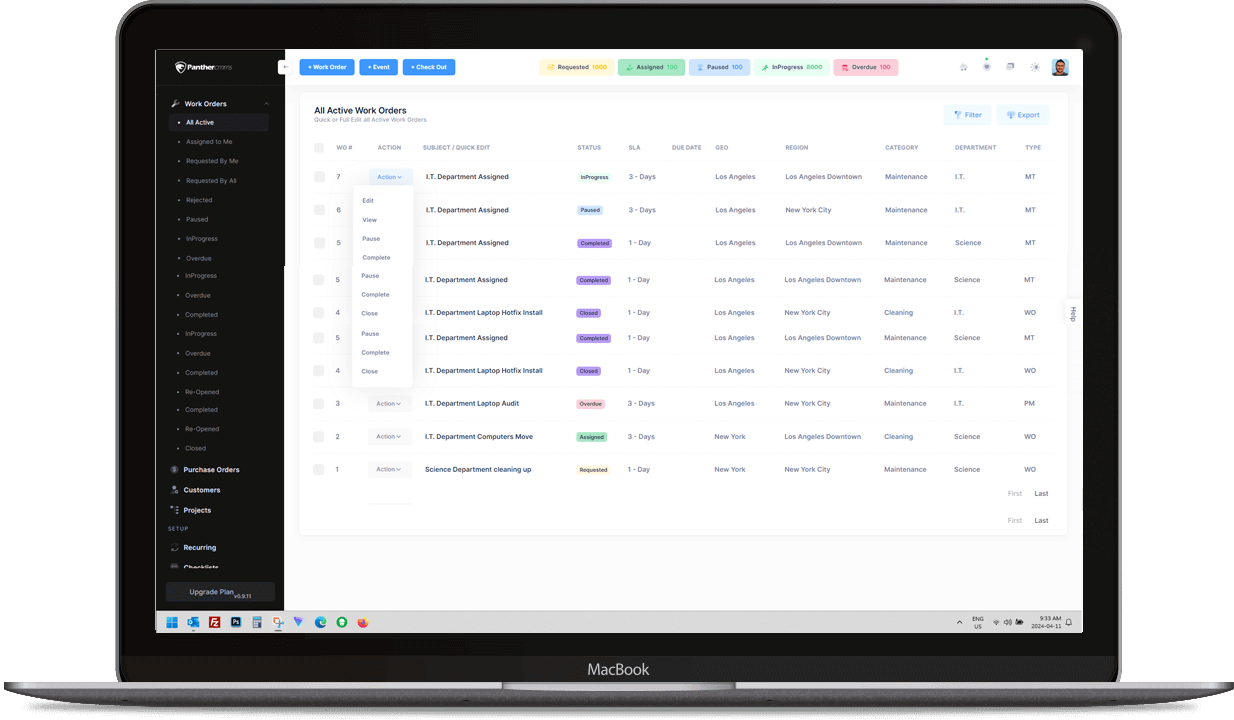
Real estate management: This involves the sale, purchase and leasing of buildings.
Occupancy management: Activities related to managing space allocation and utilization.
Maintenance management: Covers preventive maintenance, environmental compliance and overall equipment maintenance.
Asset management: Involves monitoring the condition of assets and equipment within the facility.
Financial and performance management: Includes budgeting, reporting and analyzing facility performance.
Building systems management: Focuses on energy systems and automation within the facility.
Facilities Management Software
The Importance of Facility Management
Facilities are more than just physical spaces; they are essential components that contribute to the productivity and well-being of employees. When managed effectively, facilities can create a safe, functional, and comfortable environment for everyone. This results in happier staff, increased productivity, and a boost in customer satisfaction.
Without proper facility management, various areas of an organization can suffer. Equipment lifespans may be reduced, inventory control can falter, and crucial systems may malfunction. These issues can lead to significant disruptions in the company’s revenue-generating activities.
Furthermore, facility management directly impacts employee well-being and safety. No employee wants to work in an environment with frequent equipment failures or high incidences of injury. Similarly, if employees cannot effectively perform their job due to inadequate space, extreme temperatures, or network failures, their satisfaction and productivity will decline.
Ultimately, facility management also affects customers. If buildings are poorly maintained, the quality of products and services may suffer. On the other hand, well-managed facilities contribute to higher customer satisfaction, further emphasizing the importance of effective facility management.
The Scope of Facility Management
Additionally, facility management can be divided into two broad categories: hard facilities management and soft facilities management. Hard facilities management deals with spaces and infrastructure, such as fire safety inspections, plumbing maintenance, and HVAC system upkeep. Soft facilities management, on the other hand, focuses on creating a comfortable and visually appealing environment through services like waste management, cleaning, and landscaping.
Facility management is a crucial aspect of maintaining a well-functioning organization. From ensuring the safety and comfort of employees to optimizing resource consumption, facility managers play a vital role in the overall success of a company. In this blog post, we will delve into the importance of facility management, the scope of its activities, and the various software solutions available to streamline these operations.
The Role of a Facility Manager
The success of facility management largely depends on the skills and expertise of a facility manager. This role involves overseeing the maintenance, security, and overall functionality of an organization’s assets. Facility managers are responsible for coordinating maintenance activities, managing budgets, ensuring employee safety and comfort, and planning for future facility needs.
Some key skills required for effective facility management include:
Ability to see the big picture and make informed decisions
Strong communication and interpersonal skills
Proficiency in data analysis and organizational management
Knowledge of building systems and regulations
Facility managers act as a bridge between different departments within an organization. They are responsible for maintaining the organization’s assets, ensuring employee satisfaction, and ultimately contributing to customer satisfaction.
In-House vs. Outsourced Facility Management
When it comes to facility management, organizations have the option to hire an in-house facility manager or outsource these services. The decision depends on factors such as the type of facility, maintenance budget, and existing team.
In-house facility management offers complete control over operations and can be preferred for security reasons or to avoid delays caused by external service providers. On the other hand, outsourcing facility management allows organizations to tap into specialized expertise and cost-effective solutions.
A mixed approach, combining an in-house team for routine tasks and contracting licensed vendors for specialized tasks, is a popular and cost-effective option. This approach provides the benefits of both in-house control and external expertise.
Software Solutions for Facility Management
To streamline facility management processes, various software solutions are available. Some useful options include:
Computerized Maintenance Management System (CMMS): Mobile-enabled CMMS software is ideal for managing maintenance work efficiently.
Computer-Aided click here Facilities Management (CAFM): CAFM software helps manage space, infrastructure, and maintenance-related activities.
Enterprise Asset Management (EAM): EAM software optimizes maintenance activities and tracks asset condition.
Integrated Workplace Management System (IWMS): IWMS offers comprehensive facility management features, including project management capabilities.
Building Management Systems (BMS): BMS combines hardware and software solutions to control various building systems.
Building Security System: This system helps detect risks, record incidents, and perform risk analysis.
While some of these software solutions may overlap in functionality, CMMS and EAM are commonly used tools in facility management. These solutions provide modules and features tailored to the needs of facility managers, enhancing their efficiency and effectiveness.
The Future of Facility Management
As workplaces evolve, facility management must adapt to changing needs and expectations. Modern facility management extends beyond physical spaces to include aspects like cybersecurity, well-being initiatives, resource conservation, and risk management.
Facility managers have an opportunity to bridge the gap between the C-suite, finance, and facilities by demonstrating their agility and value. By effectively managing facilities and leveraging technology, facility managers can contribute to the overall success of an organization.
If you’re interested in exploring facility management software, Panther CMMS offers various options to support your maintenance strategy. From free trials to demos, you can find a solution that suits your organization’s needs.
Facility management is a complex and essential function that requires careful attention to detail and strategic planning. By prioritizing facility management, organizations can create a safe, productive, and cost-efficient environment for their employees and customers.
Best CMMS Software
What is CMMS Software
What is Work Order Software
What is Preventive Maintenance Software
What is CMMS API
What is Asset Maintenance Software
What is Inventory Software
What is Machine Learning CMMS